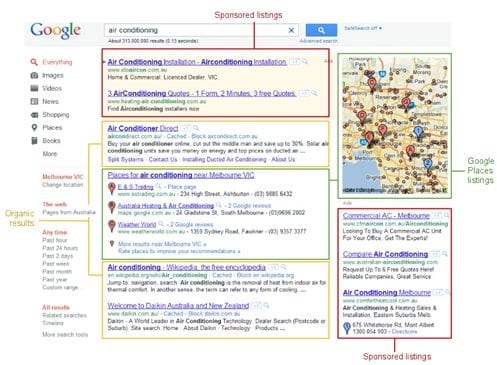 People love your site—once they’re there. But how do you get people find you online? Well, it’s not so much a question of getting listed on Google, which is actually pretty easy to do. You can submit your site or wait for it to be “crawled” by “bots” (which happens faster than you might think).
People love your site—once they’re there. But how do you get people find you online? Well, it’s not so much a question of getting listed on Google, which is actually pretty easy to do. You can submit your site or wait for it to be “crawled” by “bots” (which happens faster than you might think).
The real question isn’t “How do I get listed?” but rather, “What can I do to appear on the first page of returned search results for phrases that are being frequently searched?” The key to search engine optimization (SEO) is “playing ball” within Google’s ranking algorithms. The problem is…
…You can’t really learn the rules of the game. Google not only keeps its algorithms secret, it is also constantly changing them. It’s nearly impossible to guess what factors Google is using (at any given time) to index and rank pages. Because of the mystery of Google’s processes, two distinct camps have emerged in the SEO game.

1.) The Best Practices Camp
Building a search-engine-friendly site is really the same as building a site that is user-friendly. Once they are on your site, users will have more successful experience if you have the key phrases that they are looking for in the content on your homepage.
Thus, the “best practices” camp advocates making your content easy to read in a human, natural way. Your text needs to be:
- relevant to the topic at hand,
- legible,
- easily scannable, and
- must somehow tell a story (instead of just being a jumble of keywords).
Of course, that’s not always easy to do. In which case, you can always revert to having a cute kitty photo. Once you are done going "awwwww!" read on…

“There are tons of misconceptions and fallacies about rankings,” warns Steve Kinney of Search Optimizers. “The ‘Field of Dreams’ fallacy is that if you build it, and do the right things, then you’ll get great rankings. Best practices make a site search-engine-friendly. For all of your phrases you do x, y, and z. You do it once, and it’s done. Unfortunately, SEO doesn’t work that way.”
 “If you have a niche enough market and you feel that you can do these search-engine-friendly checklists and get highly ranked, then you’re one of the 10% of sites that can do so,” says Kinney. “But, even so, you have to watch your step and watch your back; you can lose ground quickly and easily.”
“If you have a niche enough market and you feel that you can do these search-engine-friendly checklists and get highly ranked, then you’re one of the 10% of sites that can do so,” says Kinney. “But, even so, you have to watch your step and watch your back; you can lose ground quickly and easily.”
Let’s look at the analogy of a new sport—say, stand-up paddleboarding. There are people winning competitions that you wouldn’t expect…primarily because it’s a brand new sport. Soon enough, though, younger/faster competitors take over. The older/slower competitors might get into doping, but will end up completely disqualified or have a taint on them that they can never get rid of. Gaming the system through “black hat” techniques is really no different.

2.) The Game The System Camp
Because it’s not easy to boost search rankings through best practices alone, a host of techniques have developed to “trick” the search engines into ranking a page higher.
The fact is, if you’ve read articles with “tricks” for boosting your ranking, and they’re older than June 2012, they’re kind of irrelevant. That information has been out there long enough that people have already been using those “tricks.” You might have just started learning about SEO, but all of the good “tricks” that are out there have already been absorbed. Beyond “tricks” becoming irrelevant, some of the stuff was wrong (or ineffective) the day it was written, and some of it was shady that day it was written…and will get you in trouble.
There are “black hat” SEO companies that are very comfortable operating in the gray area of what Google allows (or simply “looks the other way” about—because Google sometimes makes money on these iffy sites). Black hat companies cheat the system and, often, get away with it…for a period of time.
 Because there are layers upon layers of confusion when it comes to SEO (beyond the obvious “buy links” email that comes into your inbox), it can be difficult to spot a “black hat” company. Many of them even say, “We don’t use any illegal techniques!” Well, none of the iffy techniques are illegal; they’re just ineffective in the long run.
Because there are layers upon layers of confusion when it comes to SEO (beyond the obvious “buy links” email that comes into your inbox), it can be difficult to spot a “black hat” company. Many of them even say, “We don’t use any illegal techniques!” Well, none of the iffy techniques are illegal; they’re just ineffective in the long run.
The classic example of a SEO scandal is JC Penney. The retailer’s SEO company was using black hat techniques (i.e. link buying) that, eventually, got figured out. When that happened, tens of thousands of their key phrases that had been #1, overnight, turned into #75…or worse.
Luckily, there are two other ways to go beyond joining one of these two camps.
A.) Pay For Results
Search engines exist to give you a set of results based on which keywords you type in. Your website can be listed higher up on that search results page—for a price.
 All search engines place paid results at the top of their search listings. Some search engines are clearer about what constitutes a paid result versus an unpaid result (a.k.a. “organic”). Google prides itself on differentiating the types of listings it returns in its search results. On other search engines, it’s not always so clear.
All search engines place paid results at the top of their search listings. Some search engines are clearer about what constitutes a paid result versus an unpaid result (a.k.a. “organic”). Google prides itself on differentiating the types of listings it returns in its search results. On other search engines, it’s not always so clear.
Some businesses always feel like they need to be in the paid game—and it can be an important piece of an online marketing budget. If it’s the only way you’re going, you’ll probably find that your budget must increase over time just to keep you in the same spot. This, among other reasons, is why companies supplement their budgets to include employing a SEO company.
B.) Hire A High-End Search Engine Optimization Company
If you’re not interested in paying for placement…or you want to appear on the first page organically as well as in pay-for-play, then your best bet is to hire a high-end SEO company.
Of course, by the time you get to this step, you should already have a search-engine-friendly site. Your marketing department, web designer, and/or copy writer should have been aware of these principles and implemented them in your site. When you’re really ready to get into “the game,” though, that’s where high-end SEO comes in.
What’s the difference between high-end SEO and regular SEO? The former will give you a customized strategy, as opposed to the latter, which is likely to simply follow a set of checklists. In that regard, regular SEO is usually one-and-done, whereas high-end SEO rolls out slowly, perpetually evolves, and continues on with increasing momentum. It’s strategic, precise, and methodical.
High-end SEO takes a look at what your likelihood is, over time, of being well-ranked for certain key phrases that are actually being searched for. A team of analysts looks at a series of equations to see if you’re within the norms (a.k.a. search engine credibility), and then fine tunes the process based on advanced techniques.
 High-end SEO utilizes a very methodical approach to even pick where to start. It mathematically takes a look at where you sit in your market—among your competitors—and makes sure that you’re in a good part of the bell curve. (Being an outlier is not a good thing in this case.) “It’s not one bell curve,” notes Kinney, “but hundreds—based on each phrase. It’s tiny little analyses. In some regard, it’s like the Olympics decathlon. You may not win any one individual sport, but all added up, you can win the overall event.”
High-end SEO utilizes a very methodical approach to even pick where to start. It mathematically takes a look at where you sit in your market—among your competitors—and makes sure that you’re in a good part of the bell curve. (Being an outlier is not a good thing in this case.) “It’s not one bell curve,” notes Kinney, “but hundreds—based on each phrase. It’s tiny little analyses. In some regard, it’s like the Olympics decathlon. You may not win any one individual sport, but all added up, you can win the overall event.”
The goal is to go with core phrases that can gain a small amount of momentum that, eventually, gain larger momentum. But you don’t get to that place in a week or a month; it can take years. “You’re always moving forward or moving back,” explains Steve Kinney. “It’s a dynamic process.”
It’s not always easy to tell the difference between regular and high-end SEO companies at first glance. When you’re trying to decide which SEO company to go with, the basis for comparison should really be accomplishments (i.e. higher rankings) versus just activities (i.e. all of the strategies employed to get there). Any high-end SEO company will be willing to “show you the money”—not just the bells and whistles. That means showing results over time and references from satisfied clients.
“You should have high expectations for your SEO company,” advises Kinney. “Eventually, search should be your lowest cost form of lead generation—and it should continue to get better over time. You should expect to see a positive return on investment in six months to a year. By 18 to 24 months, that return should accelerate even more. If it’s not gaining momentum, then it’s not being done effectively.”
So, what has your experience with SEO been…or is it something you’d rather not think about?



